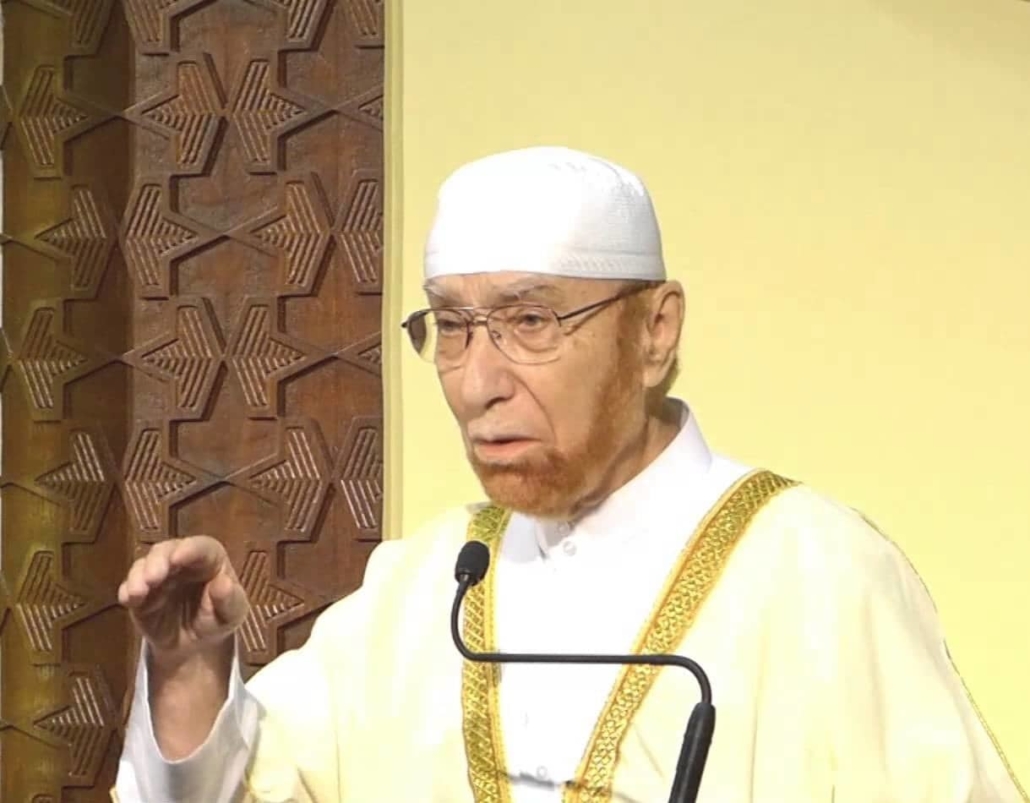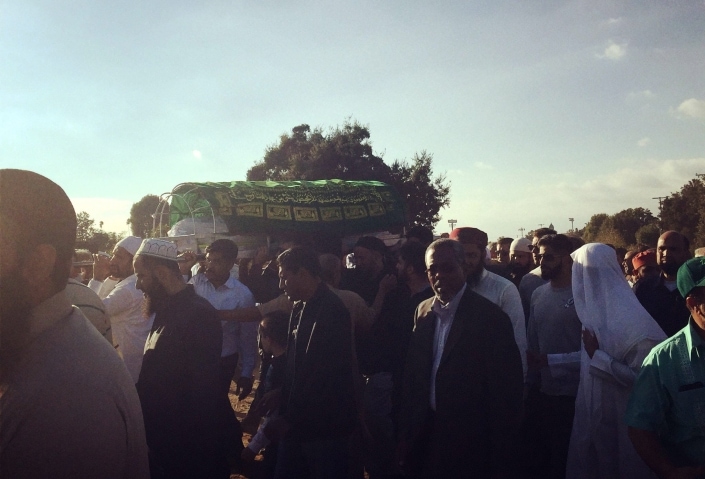“He Brought Us Back To Life” – A Tribute To The Late Dr Ahmad Sakr
November 25, 2015
Back in the late 1990’s, I gave up a $20 bill to buy a video cassette that featured a keynote speech by a world-famous Muslim scholar whom I had recently started admiring and subsequently learning from. After his talk was over, I was pleasantly surprised to see the familiar figure of Dr. Ahmad Sakr coming up to the mic, so I continued watching my TV screen. As he began sharing his humorous advice for successful marriages, I sat transfixed, hanging on every word and even grabbing a pen and paper to take notes. I later told my brother, “I bought the videotape because of Shaykh So-and-So, but — you know what? — Dr. Sakr was in it too and he was absolutely amazing! He totally stole the show!”
“Don’t you remember what he did for Muslims in Southern California in the 1980’s?” my brother asked matter-of-factly. “He brought us back to life.”
Truer words were never spoken.
Before Dr. Sakr arrived on the scene, I was a typical teenager — like countless others — who had no focus in her day-to-day existence other than pop culture, fashion, and personal amusement. The few times I went to the local mosque, I felt untethered, continuing to drift away from religion and spirituality like flotsam on the open sea.
Then Dr. Sakr threw us our life-lines and reeled us back in.
This week I was visiting my parents and siblings in Southern California when my mother asked me if I wanted to go visit Dr. Sakr who has been suffering from Parkinson’s for some years now. My response was: “Of course! When?” Our plan was to see him the next day, but on Monday evening my sister solemnly read aloud a text announcing his passing. A collective gasp reverberated around the living room.
It was as if we had felt our lifeboat shake.
A Pioneer
When you read Dr. Sakr’s biography, you learn that he was one of the pioneers of Islamic work in North America, instrumental in establishing many national organizations and institutions including the MSA (Muslim Students Association) and ISNA (Islamic Society of North America). He was the first representative and director of the Muslim World League to the United Nations. He was selected as an Outstanding Educator of America. He wrote over 50 books and sat on countless boards and taught in several universities. He won many accolades and titles in his lifetime.
But none of that felt relevant to us restless teenagers living in 1980’s California.
With smiles, jokes and kindness
So how DID this Lebanese-American father of four who was already in his 50’s manage to win the hearts and minds of all-American kids living in the suburbs of Los Angeles?
By smiling at them. By cracking jokes with them. By speaking kindly to them. By remembering their names. And perhaps most importantly of all (every adult needs to take note) — by never ever judging them.
My observations are backed up by Shibli Zaman who wrote this personal testimonial on Facebook:
“I owe Dr. Ahmad Sakr. I remember when I was an angst-ridden headbanger in my early teens with long hair, wearing Iron Maiden attire emblazoned with zombies before zombies were cool, I would get a lot of head-shaking and condemnation from my parents’ generation in the Muslim community. I was a rebel, so — to be honest with you — I looked forward to my local Muslim community’s mini-conferences so that I could rub their noses in my non-conformity.
“When I first met him, I was particularly surprised by his LACK of surprise at me. I had grown accustomed to raised eyebrows when I would meet more religious-oriented elders in my community, and it somewhat entertained me. But from him all I received was a firm handshake accompanied with a hand on the shoulder and an unusual look straight into the eyes. From that day forth, he always stepped aside to see what was going on in my life. He would always ask me, ‘So when is your Islamic heavy metal album being released?’ I had absolutely no intention of doing ‘Islamic heavy metal’, but it was his way of saying that he wouldn’t judge me; however, he wanted me to focus my efforts — whatever they were — for the cause of Islam in America. He would affectionately refer to me as ‘Shibli Nu’mani’, invoking the name of a legendary Islamic scholar of the Prophet’s biography with whom I share my first name. He had a way of bringing me back to my roots and traditions without me feeling judged. It worked.
“From accounts I have heard from countless American-Muslims over the years, this was his way. We can never repay him for his service to shaping the Muslim community in America as a demographic that is largely made up of professionals and — dare I say (in a good way, of course) — over-achievers. His message of ‘whatever it is you do, make sure you are the best at it; don’t forget who you are and give back to your community’ was heard. Rest in peace, my dear ‘Ammu (uncle). Paradise is yours, insha’Allah (God willing).”
For the purpose of this article, I reached out to friends and family, asking them to share their thoughts and memories about Dr. Sakr with me, and the commendations have been pouring in non-stop.
“He was a great American”
A mother of two, Nasha Khan, emailed me this today: “When I first began researching Islam as a 15-year-old, desperate to make sense of my world and my difficult life experiences, I began reading the Qur’an and a lot of books on Islam. Among the first books I picked up were Dr. Sakr’s Death & Dying and Life, Death and Life After. I remember poring over them in the dark quiet of the late nights when my parents thought I was sleeping. And for the first time, I felt the reality of death and the akhirah (hereafter). The fear it instilled in me spurred me to reflect on the way I lived and dealt with challenges at a young age. I can easily say his were the first books that propelled me towards the quest for Truth.”
I asked my brother to tell me something to share with the world about Dr. Sakr. He said, “He wasn’t just a great Muslim. He was a great American. He was never angry or hopeless or depressed or fiery in his sermons. He was always gentle and funny and positive and cheerful. No matter what the circumstances, he always made you feel that there was hope. That is not a small thing. That is HUGE.”
One of my brother’s friends told me, “I never heard him raise his voice. Not once. Not in any of his khutbahs (sermons) nor in any of his personal conversations. When I sought advice from him for my marriage problems, he always spoke in a calm, respectful manner and never made either of us feel uncomfortable. He was a pillar in our community and he will be missed.”
Never Made Us Feel Guilty or Ashamed
My mother reflected while talking to my father and me tonight, “You know, in all the years he taught us, he never lectured us about hijab (the headscarf). His wife covered according to shariah (sacred law) and so did his daughters and granddaughters. But he never made any of us ladies feel guilty or ashamed about not wearing hijab. He just led by example and eventually many of his students just started getting it, alhamdulillah (praise be to God). He let everyone grow at their own pace.”
Talking about not letting people feel shamed or judged, there is one particular incident that stands out in my mind. When I was a student at Cal Poly Pomona University, our MSA invited Dr. Sakr to come give a talk about Islam that was open to the public. As he was up on stage speaking about the similarities between Islam and Christianity, a man stood up in the audience, clutching a Bible, and began yelling at him about how “this man (Dr. Sakr) was preaching a false religion brought by a false prophet who produced a false book and how Jesus Christ was the only way to salvation”.
Dr. Sakr stood there smiling quietly the whole time while this man went on and on, berating him and the rest of us. At the end of his tirade, we all looked to our scholar to put him in his place. Dr. Sakr simply said, “Thank you for sharing your thoughts, my brother. May God bless you.” And then he continued with his speech.
I remember thinking at the time (as a fiery, passionate college student who wanted to change the world) that his response was too gentle and may have come across as “weak”, but now — as an adult — I realize that he was actually the embodiment of the sunnah.
When I last visited Dr. Sakr, he was immobilized by pain and lying flat on his back in bed. After hearing (not from him) about his various ailments and the negative effects of the different medications and the varying degrees of pain and the debilitating progress of the disease, I turned to him where he lay listening and asked with a smile, “But you are content with Allah?”
I already knew his answer. Without a moment’s hesitation, he said, “Prophet Ayub (Job) dealt with so much worse. All of the prophets were tried with so many tests and tribulations. This is nothing. I just have to be patient.”
It never fails to amaze me how the sign of a true teacher is one who continues to guide you during good times and bad, simply by his example.
When he attended his 19-year-old grandson’s funeral in his wheelchair six months ago, my brother approached him to kiss his hand, not expecting him to either recognize or remember him in the midst of the crowds. But Dr. Sakr squeezed his hand and said quietly in his familiar, elegant accent, “Doctorrrr….inna lillahi wa inna ilaihi raji’oon (we surely belong to Allah and to Him we shall return).” He was always a paragon of sweet patience in the presence of immeasurable pain. (He was buried today only a couple of graves away from his eldest grandson.)
Loved by teenagers
My 15-year-old niece texted me this evening: “To all of us kids from Institute of Knowledge, Dr. Sakr felt like a grandfather. When our school was in his building, he used to come down after Dhuhr (afternoon) prayer and give us advice about everything; and it was advice many of us still remember very well. He would stress all the sunnahs, especially fasting. If we liked one of his books, he would gift it to us. He was really kind and loving. We all loved him very much.”
Upon reading his daughter’s words, my brother said, “What I find so remarkable about this man is the tawfiq (success) he had from Allah. If you think about it, he taught three generations of our family: our parents, us, and our children.”
“My teacher…my teacher…my teacher”
When I was at the beautiful Islamic Center of San Gabriel Valley this afternoon for Dr. Sakr’s janazah (funeral) prayer, I was fascinated by the throngs of people who had shown up to pay their last respects. There were men and women from all strains of Islam — Arabs and South Asians and East Asians and African-Americans and Sunnis and Shias and Deobandis and converts from North and South America. As I walked through the clusters of people in the large hall, I overheard snippets of conversations, many accompanied by tears: “He was my first teacher…” and “I have lost my beloved teacher…” and “I will never have another teacher like him…”
“Did you notice?” my girlfriend asked me. “Everywhere you hear: ‘my teacher…my teacher…my teacher.’ THAT was his gift. He made everyone feel like they were his most special student and he was their only teacher.”
As we were stepping out of the main doors, my father stopped to talk to one of the uncles who is intimately involved with the running of the mega-mosque. Apparently, for years, the Islamic Center has been unsuccessfully trying to get its permits approved so that the mortuary could finally be functional. With a sense of reverent awe, this uncle informed my father that the final official approval came in just last week, and Dr. Sakr was the first community member whose body was bathed and prepared for burial and stored in the very center where he had been the imam so many years earlier. Today, Dr. Sakr inaugurated the mortuary which will be serving the community for as long as the center stands, insha’Allah.
Words do not suffice
After hearing this news, my parents and I climbed into the car that was waiting to take us to the cemetery. Once there, I was carried along by the crowds and suddenly found myself standing near the head of Dr. Sakr’s grave, watching people eagerly stepping forward to fulfill his last rites. I blinked back tears as I watched my middle son Ameen, surrounded by his shuyukh (teachers), carefully lifting up three handfuls of dirt with his right hand to gently drop onto Dr. Sakr’s casket. When he turned his head and our eyes connected for the first time, I had a difficult time getting out the simple words: “He was my teacher.” I wanted to somehow convey to my son the affection and appreciation I felt for this man who had made me first fall in love with my religion all those years ago because I knew Ameen of all people would understand, given how much he adored his own teachers. But I couldn’t say anything and he just silently hugged me, patting me on my back in a sincere attempt to comfort me.
Later that evening at home, my brother told my parents and me, “If I die before you all, please bury me somewhere near Dr. Sakr. I have no doubt that he’s a wali (friend of Allah), insha’Allah.”
At one point, my eldest son Shaan mused, “So even my being president of the MSA at my high school is thanks to him, isn’t it? If he had never helped establish MSA’s in America in the 1960’s, who knows if we would ever have had them by the time my generation came along?”
Before he went to bed, my mother handed Shaan a copy of Dr. Sakr’s book Khutab from Mihrab (Sermons from the Pulpit), a collection of his Friday sermons which my brother had said helped him and his friends conduct Friday prayers in the Caribbean back when they were in med school there in the 1990’s. “Maybe this can help you with your Friday MSA meetings from now on,” my mom told him, and Shaan nodded his head thoughtfully. As I saw the book exchange hands, I couldn’t help reflecting how the knowledge was being passed on from one generation to the next, but the teacher was no longer here.
Such is the nature of life.
Ever since hearing about Dr. Sakr’s passing, all of the lessons he ever taught us have been swirling around in my brain. The first time I ever performed (or even learned about) Salat-ul-Tasbeeh was behind him. The first time I felt the sweetness of staying up and worshipping with the community on Laylat-ul-Qadr (Night of Power) was with him. The first time I realized the power of prostration or the fact that the tashahhud (testimony of faith) in prayer was a personal conversation with God was thanks to him. He taught us to prepare for the afterlife and now he’s gone on to experience it before us. How does one thank a teacher for all that he’s done for him/her? How does one even find words that are sufficient enough?
Dr. Sakr’s son-in-law shared with us some details of his final moments. He told us that Dr. Sakr had completed the Isha (late night) prayer and had asked his wife to let him hear the renowned Shaykh Muhammad Jibril’s lyrical recitation of Surah Kahf which he always enjoyed so much. She told her husband that her iPhone was low on battery, so she would go charge it. When she returned, he had passed.
He died as he lived…teaching us all the way
I end this piece with a hadith (saying of the Prophet Muhammad) for everyone to reflect on and a plea for everyone to repeat.
The hadith was reported by Abu Huraira (may God be well-pleased with him): The Messenger of Allah (peace and blessings be upon him) said, “When Allah loves a servant, He calls Jibreel (Gabriel) and says: ‘Verily, I love this person, so you should love him.’ Then Jibreel loves him and makes an announcement in the heavens, saying: ‘Allah loves this person and you should love him.’ Thus, the dwellers of the heavens love him and he is honored in the earth.”
And the plea is the same one I heard Dr. Sakr’s devoted wife softly murmuring as she followed his funeral cortege to the gravesite today: “Allah, have mercy on Ahmad.” Aameen.



